
 |
||||||||||||||
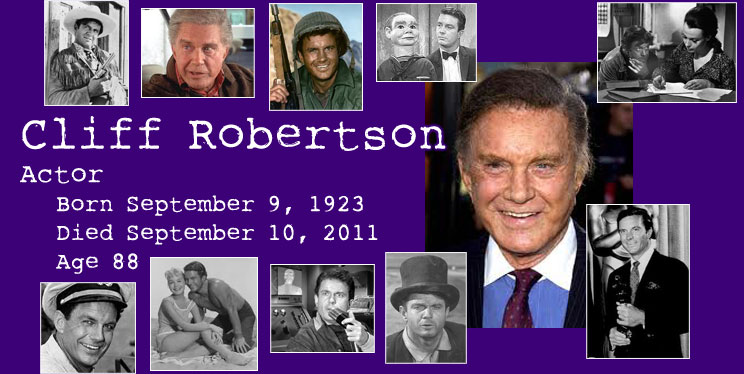 |
||||||||||||||
Brave Last Dave volunteered, and I knew I would be a fool not to accept. Another brilliant update from the peruser of supermarket tabloids. And it was a solo for Koko-Moxie's first hit of the year. Yeah! Ten points. * * * The wisdom of Kirk Lazarus, as portrayed by Robert Downey Jr. in 2008's Tropic Thunder, came forty years too late for Cliff Robertson. Never go full retard. But wait, you might say! Cliff Robertson won a goddamn Oscar going full retard in Charly. True. But he threw any chance to be an honest-to-God movie star clean away. Here is William Goldman's definition of a movie star. If people say "Let's go see the new George Clooney movie" instead of "Let's go see the new political thriller," this is strong evidence that George Clooney is a movie star. Do people say "Let's go see the new Ryan Gosling movie"? Not yet. So far, Ryan Gosling is a working actor but not a movie star. By this definition, was Cliff Robertson a movie star? In retrospect, there are two successful "Cliff Robertson movies." The first is 1963's PT-109, where he plays the young war hero John F. Kennedy. (Robertson was JFK's personal choice. Jackie wanted Warren Beatty to play the role. Jackie was a better judge of male star power.) The second is 1968's Charly, for which Robertson won the Academy Award for Best Actor. A great role, he did a great job, but it was not the path to stardom. Within a few years, he was back to being a TV actor or getting good supporting parts in movies like Three Days of the Condor starring Robert Redford, a movie star by anyone's definition. He started working seriously in the early 1950s. He was in Picnic with William Holden, a movie star. He was The Big Kahuna in Gidget. He had two roles on The Twilight Zone, he showed up on The Outer Limits, Wagon Train and Batman. No doubt about it, Cliff Robertson was a working actor. Not a movie star, but a guy who worked regularly in projects with actual budgets. Even being a working actor has its perks. He married Dina Merrill, who was both gorgeous and an heiress. Good on ya, Cliff. And then, in the late 1970s, David Begelman forged Cliff's name on a $10,000 check and cashed it. The popular view is that show business is honeycombed with crooks, from unions with "no-show" jobs to studio executives getting people to sign ridiculously unfair contracts. Even so, Begelman was much more blatant and considerably more foolish. Some argued he must have had some psychological disease that made him want to get caught. My theory is Begelman cut his teeth at Lew Wasserman's MCA, which was every bit as good a factory for turning out hardened criminals as San Quentin. I think he probably saw people get away with much worse in his career. He just happened to try to screw an actor who actually went over his own books. In any case, Cliff Robertson the working actor became the "not-so-much working actor" for a few years after he blew the whistle, but David McClintick's book on the scandal, published in the early 1980s, helped lift the partial blacklisting. It also helped a lot that AT&T gave Cliff a job as a spokesperson that decade. By the mid-1980s, he was back to making TV-movies and getting key supporting roles on the big screen, like Hugh Hefner in Star 80. His best-known role this century is as Peter Parker's Uncle Ben in the Spider-Man movies. You know, "With great power, comes great responsibility." Comic books getting all Biblical and shit. A long career. An Oscar and an Emmy, The Big Kahuna, JFK, Hugh Hefner, Uncle Ben, a steady paycheck from AT&T, a fabulous babe wife, he's the good guy in a big scandal and it doesn't kill his career. For a non-movie star, Cliff Robertson played the game pretty well. Still, Kirk Lazarus was right. Never go full retard. — Brave Last Dave |
||||||||||||||
 |
||||||||||||||
The obituary for Andy Whitfield in the New York Times was written by Sarah Maslin Nir, who was in my daughter's Hebrew school class for, like, ten years. She usually does the gossip column, which is called The Nocturnalist, so this must have been her first obit and the editor must have been somewhere else, because it ends, "In her statement, his wife described him as 'our beautiful young warrior.' She said he died in her arms." The rest of it isn't much better, but this is what you get when you die young and beautiful and in a seemly manner. (Drugs are far better for young people obits. Suicide, too.) The star of Spartacus: Blood and Sand died of non-Hodgkin's lymphoma, and the L.A. Times took the opportunity to turn it into a health article, and explained ad nauseam about non-Hodgkin's lymphoma, and how its rates have doubled since the '70s and stuff like that. It was actually kind of interesting. Then they updated it to announce that the president of Starz, the cable network where Andy Whitfield bared his chest, was "saddened." Andy Whitfield, I know, was a consummate professional. Abby, Allezblancs, Charlene, EdV, Erik, Mark and Morris the Cat each get a whopping 20 points. Poor Andy. He was only 39. — Amelia |
||||||||||||||
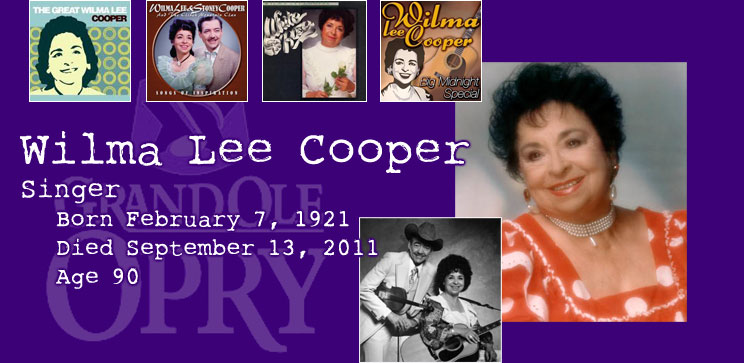 |
||||||||||||||
How cool is this update by Busgal, whose solo it was as well? Very cool. Thank you, Busgal. * * * Music was a lifelong passion for Wilma Lee Leary Cooper. Wilma Lee was the first of three sisters who joined their parents' group, The Leary Family, singing around north-central West Virginia. Eleanor Roosevelt invited them to play at the Washington Folk Festival in 1938. While The Leary Family was in D.C., they made recordings for the Library of Congress. After high school, Wilma got a degree in banking from a regional college in Elkins, WV. Around the same time, Stoney Cooper joined the family group on guitar and fiddle. Soon after their marriage, Stoney and Wilma formed the Clinch Mountain Clan and, in 1947, they joined the Wheeling Jamboree on WWVA. Ten years later, they moved to Nashville and joined the Grand Ole Opry. Wilma was considered one of the first females in bluegrass, with her strong, clarion alto vocals and her skills on banjo, guitar and organ. While she and Stoney had some success with country singles, such as "Big Midnight Special" and "There's a Big Wheel," her gospel work, like "The Tramp on the Street," stands out. She was Hank Williams' favorite female vocalist. After Stoney's passing in 1977, Wilma continued to perform until she had a stroke in 2001. Their daughter Carol Lee Cooper Snow is known as the leader of the Carol Lee Singers, a background vocal group for many Nashville recordings and the Opry. (Carol Lee is married to Hank Snow's son Jimmie.) — Busgal
|
||||||||||||||
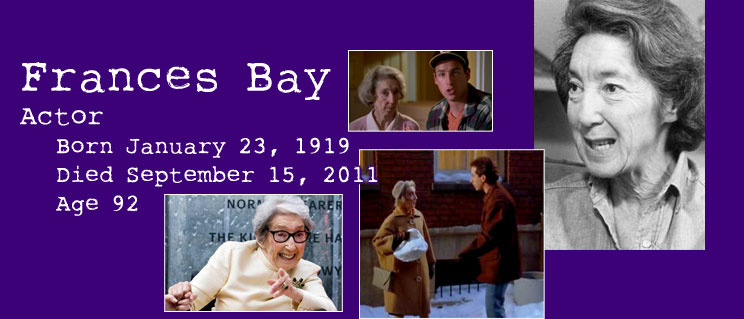 |
||||||||||||||
Remember the year when all those musicians died? And the year all those poets died? Take your vitamins if you're a character actor. The grim reaper has a small but significant part for you. Frances Bay's name meant nothing to anyone. Her face and her voice, on the other hand, drew cries of YES, I know her. How prolific was she? She starred in sitcoms and theater and David Lynch films. The mind boggles. She was one grandmother in Happy Gilmore, Grandma Nussbaum in Happy Days, she was the marble rye lady in Seinfeld, a profoundly overrated episode. She didn't start young. When she was already in her 50s she sought out an agent and demanded work. She was a favorite of David Lynch. She was the middle-aged lady, then the older lady, then the elderly lady, and the occasional Mrs. Santa Claus. And now she's "dead lady." A spectacular solo for Beth and Teresa. (That's one team.) They get 7 points — 2 for age and 5 for solo. — Amelia |
||||||||||||||
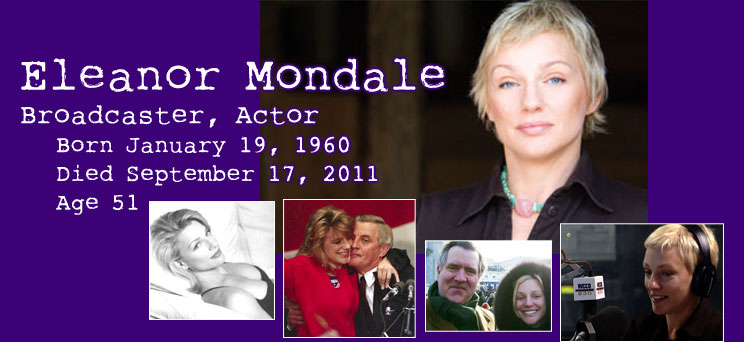 |
||||||||||||||
By her own admission, Eleanor Mondale liked to get wild. Gossip columnists didn't have to try very hard to get a scoop on her. She dated Ahhhnold, Warren "sleeping now" Zevon, football players and rock stars. Her early marriages were Kardashian-brief. The party circuit had no current without Eleanor. She tried to be an actress, with bit parts in Three's Company and Dynasty, but quickly realized that her rightful place was in front of news schlock cameras. This is known as her "journalism" career, when she was a radio or TV host, but it's just one small market job after another, being a sidekick, or a correspondent. Nothing lasted very long, nothing grew into anything special. You need an example? She was the host of "The Great American TV Poll" on Lifetime. Here's another: She did stories on auto shows for the Speed Channel. She was a regular on Howard Stern's TV show. She was lovely and smart and funny and well-connected, but someday she may be most famous for being in the Starr Report. You remember the Starr Report. She was visiting Bill while Monica was kept waiting. There are no dresses associated with Eleanor. Eleanor Mondale found peace with one last rock star, Chan Poling of The Suburbs. She died of a miserable brain tumor at 51, a fate even a small-market radio host does not deserve. EdV, Koko-Moxie, Morris the Cat and Roxanne Wiggs do, however, deserve 14 points. When this hit happened, Morris the Cat had 200 points, which Brad pointed out to me was 100 times more than R H Draney. — Amelia |
||||||||||||||
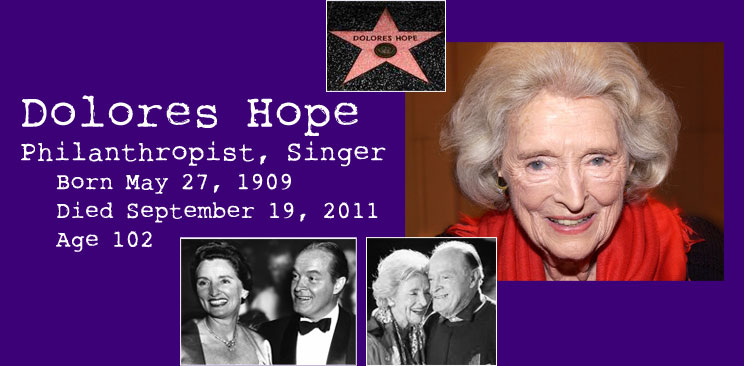 |
||||||||||||||
Bill would like me to write that Dolores and Bob Hope were never married in Erie, Pennsylvania. I'm not sure what the problem was, but there's either no record of their marriage, or they married elsewhere. He'll correct me if I got it wrong. The more conventional story is that Bob saw Dolores Reade perform in a nightclub in 1933 and was instantly mesmerized, and they stayed together happily for the next 70 or so years. There is, of course, the less-than-conventional sidebar about Bob's sexual appetites, which are legendary and are detailed in a bunch of places. You could look it up. Bob Hope never worked dirty. He was too busy playing dirty. Dolores was well aware of Bob's womanizing but it never bothered her, she told John Lahr, because she thought she was better-looking than anyone else. I bet she drank. She had a kind of last laugh. As Bob was doddering his way into retirement, Dolores resumed her singing career, which he had effectively stopped upon marrying her. She cut four albums, sang with Rosemary Clooney at Rainbow and Stars. A bizarre explanation as to why she waited until her 80s to pick up where she had left off: Bob, she said, had never wanted her overexposed. Overexposed. For seven decades, she played gin rummy with the girls and went to church twice a day while he gallivanted around the world. There's a bittersweet clip of the Hopes singing a duet of "Silver Bells" on TV in 1978, where Dolores is in fine voice. But she looks like a deer in headlights. Maybe he was right, after all. OK, was it worth one stinking point, guys? Allen Kirshner, Buford, Dead People Server, Deceased Hose, Happy No Year, Kathi, Loki, Ray Arthur, Roxanne Wiggs, The Wiz and Undertaker? I guess so. — Amelia |
||||||||||||||
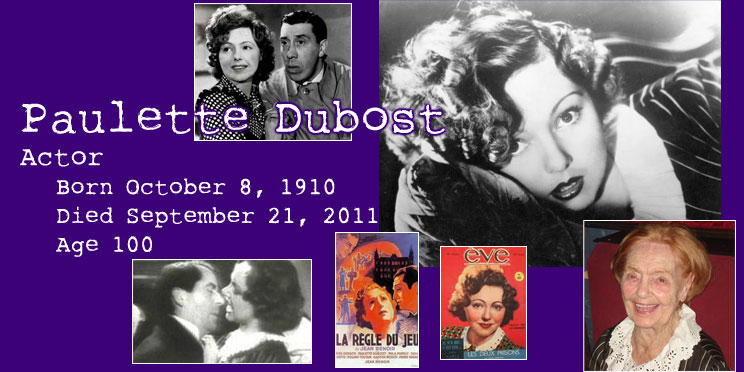 |
||||||||||||||
French actress Paulette Dubost, who has died at 100, called her memoirs La Vie, C'est Court. Which translates to Life is Short. Boy, did she get that wrong. Best known for Renoir's Rules of the Game in which she played Lisette, the chambermaid, hers was originally a small role that was built up after she arrived on set. As you can see from the photos that Brad has found, she was adorable. (Same word in French.) In the early '30s she played the love interest of Fernandel in several films, and she gave Buster Keaton a big kiss at the end of the only French feature he made, Le Roi des Champs-Elysees. Big kiss. Big smile. She turned down offers from Hollywood and spent the war in Morocco. Ophuls cast her in Le Plaisir and in Lola Montes. As she aged, she started playing Moms, but also the occasional barmaid or servant for old time's sake. Louis Malle used her in Viva Maria and, 25 years later, in Milou en Mai. For Truffaut, she was Catherine Deneuve's dresser in Le Dernier Metro. She made 200 films, worked into her 90s with all the great directors and, until I started writing this, I'm ashamed to admit I had never heard of her. Buford had, of course. He seems to have a lock on all the old people. He gets 1 for the hit and 5 for the solo. Total: 6. — Amelia |
||||||||||||||
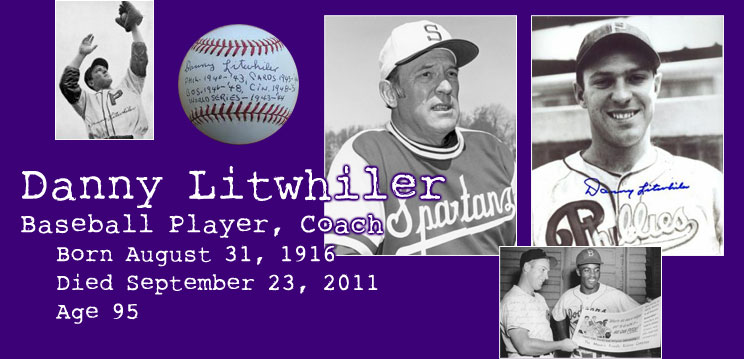 |
||||||||||||||
Bill writes the baseball updates for a reason: * * * You remember that first baseball glove your dad bought you when you just got out of diapers? The intoxicating smell of the leather, the deep pocket, the rawhide stitching? That pocket, that stitching — that was Daniel Webster Litwhiler's idea. In 1942, Danny Litwhiler, who was an everyday outfielder for the Phillies, became the first major league baseball player to have an errorless season. Guess which year he first stitched the fingers of his glove together? Even more amazing, Litwhiler had jammed both of his shoulders that season. When he caught a fly ball with less than two outs and a runner[s] on base, the shortstop, Bobby Bragan or Danny Murtaugh, would run to short centerfield and Litwhiler would flip them the ball so they could hold the runners. His best years as a major leaguer were the war years (he was 4-F), although he was still a fine baseball player. However, as a teacher of baseball — a Division I coach — he was a Hall of Famer. He is a member of the College Baseball Coaches Hall of Fame, the FSU Athletics Hall of Fame, the Michigan State Hall of Fame, the Bloomsburg State Hall of Fame, the Royal Dutch Baseball Association Hall of Fame, and the Pennsylvania Sports Hall of Fame. As a college coach (Florida State and Michigan State), Litwhiler coached future major leaguers like Dick Howser, Kirk Gibson, Steve Garvey, Rich Billings and Rick Miller. As an inventor, he was the first to develop a radar gun to measure pitching speed, the bottom-only baseball bat for bunting practice, and the "diamond grit" used for drying wet fields. As an AO Deadpool pick, because he was 95 when he was tagged out, Litwhiler was worth two points to Buford, with an extra five bonus points. Total: 7. — Bill Schenley |
||||||||||||||
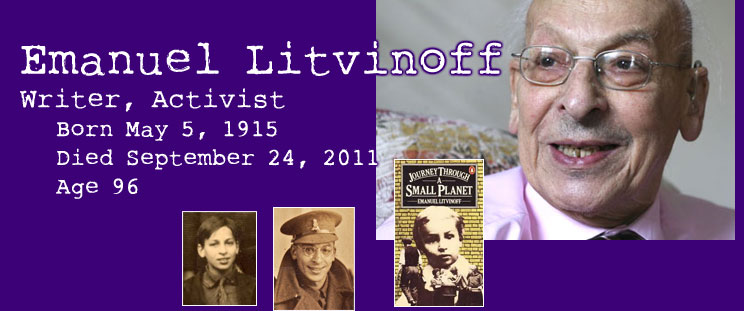 |
||||||||||||||
A friend came up to me at a party a few weeks ago and asked me to guess his favorite obituary of the year in the New York Times. He was sure he was going to stump me, so imagine his surprise when I said Emanuel Litvinoff, the English-Jewish writer. Margalit Fox did a very nice job, he thought, telling an amazing anecdote about Litvinoff and T.S. Eliot and Stephen Spender. I'll fill you in, but first a little background. Litvinoff wrote much poetry and several thinly veiled novels about the struggles of Jews in the European diaspora. The only one we've read here, and own, is Journey Through a Small Planet, his memoir of the Jewish community in London's East End. He brought to the world's attention the atrocities being carried out against Jews in the Soviet Union. His childhood was miserable. His father went back to Russia at the outbreak of the First World War, never to be heard from again. His mother remarried, had five more children, and they all lived in two rooms. He took menial jobs in the Depression, got a pair of boots from the Jewish Board of Guardians, and worked in the fur trade. All along the way being victimized by the gentile British anti-Semitism. His local library was a second home. He joined the Young Communist League, started writing poems and went to war. He never stopped fighting. So here's the story that Margalit told so well (although it had been in all the English obits, so a bit of a cut and paste job). Litvinoff was very unhappy with early T.S. Eliot anti-Semitic poetry, an example of which is: "Burbank With a Baedeker: Bleistein With a Cigar."
It wasn't the writing of which that enfuriated Litvinoff, it was the republishing of it in the post-Holocaust world. So he wrote a poem himself called "To T.S. Eliot." It ended:
One day in 1951, at a very public reading he read it, knowing that Eliot, by this point a Nobel laureate, was in the room. Pandemonium ensued. Spender, himself half-Jewish, married to a Jew, got his knickers in a twist and the crowd worked up, and they all yelled at Litvinoff for insulting the great poet. The one dissenting voice was a quiet one. Eliot muttered, "It's a good poem. It's a very good poem." Emanuel Litvinoff was in his 90s when he died. And the Independent reported in its obit that the local authority's home support recommended by his hospital doctors was withdrawn. "It seems the same as 1931 all over again," he said. "This is a depression caused by financiers and bankers, but it's the poorest who are paying for it." I had the hit. 2 + 5 = 7. — Amelia |
||||||||||||||
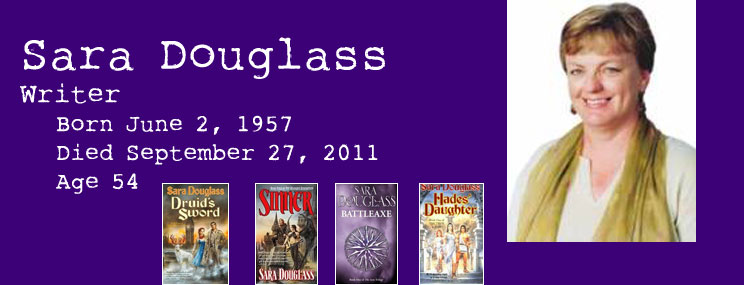 |
||||||||||||||
DDT volunteered for the update, and did a marvelous job. Or should I say fantastic, given the subject? Thanks a bunch. BaseballArt got his first hit of the year with this one, and he's joined by Bill Schenley, DDT, EdV and Roxanne Wiggs. They each get 14 points. * * * Sara Warneke — she used the pen name of Sara Douglass — was a former nurse who later became a university lecturer in medieval history. She will be most widely remembered as a best-selling fantasy writer, and she sold more titles in this genre than any other Australian author. She was born in Penola (in rural South Australia) in 1957, the daughter of sheep farmers. When Sara was seven her family moved to Adelaide, where she completed her education. Unsure of the career she wished to pursue, her parents persuaded her to become a nurse. She later wrote of how she loathed the job, how she hated being watched by "anxious, staring patients," and of how depressed the starched and disinfected hospital environment made her. Despite her discontent, she remained a ward sister for seventeen years. Eventually, although not completely abandoning nursing, she enrolled for a history degree at the University of Adelaide and quickly found that she was in her element. She went on to complete a Ph.D. in history and then embarked on a new job as a university lecturer. Sister Sara had become Dr. Warneke, but still she couldn't find happiness. She struggled to cope with the stresses of her work and, desperate for something else to do, started writing fiction. She quickly escaped into a fantasy world of warriors, castles, tempests, magicians and mythical lands. She conjured up epics in which invented tribes of people did battle with demons in enchanted forests, goblins abounded, knights fought dragons, starships flew by, and heroes kissed heroines at the edges of sacred lakes. Finally, as Sara Douglass, she had discovered what she wanted to do, and she continued writing novels for the rest of her life. She was a prolific author — Douglass wrote one quartet, four trilogies and four standalone novels in fifteen years — and quickly built up a dedicated fan base. She was signed up by the publishers Harper Collins, and her books sold in their millions. In 2008, Sara Douglass was diagnosed with ovarian cancer and was initially successful in her battle to beat the disease. However, the cancer returned in 2010, and she was told by doctors that her condition was now terminal. In response, Douglass wrote a defiant, valedictory essay entitled "The Silence of the Dying," in which she used her own experiences to hit out at modern society's collective fear of illness and death. This piece of work, which appeared as an article in newspapers and magazines throughout the world, gave Douglass new prominence. Now terribly ill, she continued to write, and also found comfort in connecting with her fans via the internet. A keen gardener, she asked her fans to think of her when they were raking. Gradually her Facebook posts and blog updates diminished until, finally, she was hospitalised, dying two weeks later. Sara Douglass was a very private individual, and there is virtually no information in the public domain about her personal life. She was unmarried and had no children; friends supported her in the last months of her life. Even in death, her reclusive nature was evident — there was no formal celebration of her life and no funeral. Her burial was attended by just three people. — DDT |
||||||||||||||
 |
||||||||||||||
I asked Chipmunk to write this and she was more willing to give up the hit than write it. Well, that was enough inspiration for Bill to give it his very best. Hilarious. * * * "Pierre Dansereau was a Canadian ecologist known as one of the 'fathers of ecology.'" Lead sentence in the late Dr. Dansereau's Wikipedia entry. Now, I'm confused by the "one of the fathers of ecology" statement. The Earth is 4.5 billion years old; Dansereau was old — 99 — but not that old. Hasn't ecology been around a tad longer than Dr. Dansereau? Even ecology as a biology discipline predates this guy by years. Hippocrates and Aristotle made notations and observations on the natural history of plant life and animals. Then there was that fellow ... Charles Darwin. So why is Pierre considered "one of the Fathers of Ecology?" Is it because he was a Canadian and Canadians are given so very little as it is? So, anyway ... here is a look at how interesting this guy was:
Yeah, bored me to tears, too. Oh. And wait. One more thing. He was married to the same woman for 76 years. She just turned 100. That had to be so much fun. Still, I read on Wiki that he was the life of the party in Canada. No, really. In 1974 he was awarded the Molson Prize, which, I guess, is some kind of beer/party prize. Chipmunk Roasting carried this guy's abiotic and biotic factors for four years. I hope he was worth the wait. She gets two points for this exciting hit, and another five for being the only person on six continents to even know who he was ... Total: 7. — Bill Schenley |
||||||||||||||
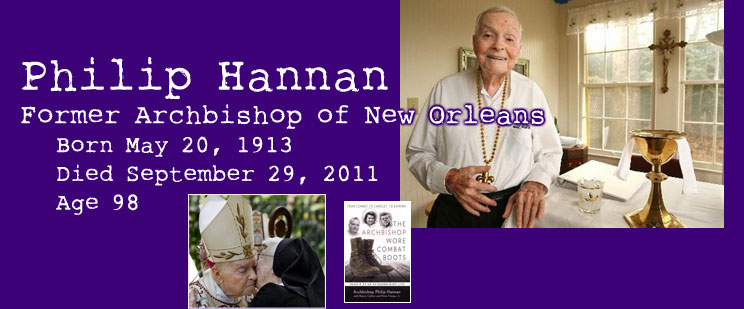 |
||||||||||||||
You know, this is the time of the year where we write the call for entries, and I can tell you that there will be no more assistant coaches and, if I had my way, no more archbishops or religious people of any kind. They're just boring. Except this one. Archbishop Hannan delivered JFK's eulogy, even though he was just a bishop at the time, because he had known him since the '40s. When he was just a Father, he became friends with JFK by smoothing over a misunderstanding that Kennedy had with a Jesuit priest, a story I'd love to know. He also officiated at a reburial of two Kennedy infants in 1964 so they could be with their father, a story I never heard before. They did it in the middle of the night. Then, even though he had become the archbishop for New Orleans, he came back to eulogize Robert Kennedy. Then Jackie. I'm sure her family was very grateful for the earlier work. When he became the archbishop in New Orleans he was quoted as saying, "This is the only city where an archbishop can walk into his cathedral while a band outside plays 'When the Saints Go Marching In.'" He was anti-abortion, didn't like Communists, and he took a funny position on nuclear disarmament. But he was adamant about serving the poor and did it very well. The archdiocese of New Orleans operates one of the biggest Catholic Charities in the nation. He set up a hospice for AIDS patients and one of the largest housing programs for the elderly. Where he, in fact, lived until his death at 98. I hope there was at least one Kennedy at his funeral. DDT and Gerard Tierney get the hit together. 2 + 3 = 5. — Amelia |
||||||||||||||
 |
||||||||||||||
I decided that the terrorists would win unless we, at alt.obituaries, had more poetry in our lives. So I asked Jim Thornton to write us some. And it's lovely. Deceased Hose gets a whopping 23 points, 18 for the hit and five for the solo. Direct line to the White House, DH? * * * The "Bin Laden of the internet" is so far the only American executed under a presidential "targeted killing" order. Al-Awlaki came to prominence as one of a bunch of self-appointed radical Imams with links to the 9/11 attacks. His US citizenship, engineering degree from Colorado and mosque in San Diego made him newsworthy. The evidence against him was only circumstantial and he didn't relish taking the rap, so he condemned the attack as un-Islamic, got a short-lived reputation as a moderate, and skipped off to Britain. Soon he was calling again for jihad among the sillier fringes of Islamic student groups and setting up all sorts of internet propaganda pages. By 2004 even the tolerant Brits were hacked off, so he decamped to Yemen, where his father is a senior politician. His Western knowledge and perfect English inspired many new recruits, including the perpetrators of the 2005 London bombings, and before long he had a popular Facebook page and videos on YouTube. This pissed off Osama bin Laden, who had neither. It also pissed off Barack Obama, who might have turned a blind eye — all religions have barmy clerics calling on followers to kill unbelievers — but couldn't ignore his actions. Al-Awlaki organised two failed bombings: Flight 253 from Amsterdam to Detroit by Umar Farouk Abdulmutallab, and the UPS bomb plot against Chicago synagogues. Al-Awlaki's fingerprints were on the Times Square bombing and the Fort Hood massacre. Earlier this year, Obama lost patience and ordered the CIA to kill al-Awlaki any way they liked. On Sept 30th, a drone got him on. His father protested that he was just an all-American boy, and the usual bleeding hearts fretted over lack of due process. But the simple souls whom he led astray, and the innocents who would sooner or later have been killed, should be delighted. |
||||||||||||||
|
||||||||||||||
 |
||||||||||||||
This is going to be one of those great football updates that I am known for. Mike Heimerdinger, a guy who used to be the Tennessee Titans' offensive coordinator, is dead. Okay, kids. That's pretty much all I have on this guy. All right, all right, I'll do some half-assed research and write something footballish on a fucking offensive coordinator. First, however, I have to comment on this guy's name: Heimerdinger (HI-mer-DINGER). I mean, who the fuck has a name like Heimerdinger and doesn't change it as soon as they are legally eligible? His wife, Kathie, she had to have a last name like Schicklgruber or Hasenpfeffer to consent to a marriage with a guy named Heimerdinger. Okay. Mike Heimerdinger had an illustrious college football career at Eastern Illinois University as a wide receiver. Yeah, I know, 'cause don't we all follow EIU football? Anyway, he was best known as a coach at ... Wait. Hold on. He was best known for dying. Anyway, this is what he did with his life: He coached at Grant High School, Johnsburgh High School, Florida, the Air Force Academy, North Texas State, Florida (again), Cal State Fullerton, Rice, Duke, the Denver Broncos, Tennessee Titans, New York Jets, Broncos (again) and, again, the Titans. After that, he was unemployed and then dead. Yeah, yeah, I know. I probably should have gotten into that whole Steve McNair thing, or the Vince Young fiasco but, look, we're all grieving at a time like this, so let's just move on ... Allen Kirshner, Deceased Hose, Monarc and Morris the Cat are not so much grieving. The four of them are more into — from this distance — what appears to be some kind of end zone dance. Must be over the two touchdowns and the two PATs. Total: 14. — Bill Schenley |
||||||||||||||
